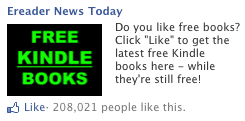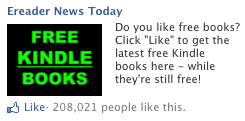So I couldn’t help but notice this ad on my wife’s Facebook page:
You gotta admit, the bold, fluorescent green font proclaiming FREE books would grab they eyeballs of most anyone, and capture the attention of every avid reader that sees it. Unfortunately, that’s where the ad’s effectiveness ends.
Eye-Catching? Yes. Persuasive? Not At All
See, if I wasn’t in the business of writing about ads, I’d never have clicked through on this one. Why? Because the instant I understood the offer, I thought “Yeah, Sure.”
As in, “Yeah, sure they’re free, but they’re also probably 4th-rate dreck created by previously unpublished — and likely unpublishable — authors. Either prove it’s otherwise, or I’ll have to say, ‘No Thanks.‘”
So, thinking that, I looked at the copy hoping to find some proof that this wasn’t the case.
Unfortunately, there was none to be found. Instead, what I got was advanced notice that Ereader News Today wasn’t about to give up ANY indication of what kind of books they’d link me to until AFTER I’d already “Liked” them. And the bragging about providing “The Latest” free Kindle books, rather than the BEST free kindle books, didn’t inspire any confidence either.
What the Ad Copy Should Have Done
The Image and Headline are there to grab eyeballs and gain enough interest to get the ad read. That’s their job: the Attention and some of the Interest part of the AIDA copywriting formula. And for this ad, they got the job done.
Anticipating and Answering The “Yeah, Sure” Response
 As for the body copy, its job is to help deepen desire, mainly by addressing issues of credibility. In other words, the copy often has to answer the “Yeah, Sure” response. In this case, the copy SHOULD have reassured me that Ereader News Today provided links to 5-star books by previously published authors as well as the “latest” free kindle books.
As for the body copy, its job is to help deepen desire, mainly by addressing issues of credibility. In other words, the copy often has to answer the “Yeah, Sure” response. In this case, the copy SHOULD have reassured me that Ereader News Today provided links to 5-star books by previously published authors as well as the “latest” free kindle books.
And if that wasn’t possible, they should have at least made some attempt to reassure the reader that some attempt at curation and selection was being made on behalf of the reader — that we weren’t just getting spammed with newly released books of totally unknown and unproven quality.
Now THAT would have likely gotten my click. But there’s one more thing to talk about…
Giving R-E-S-P-E-C-T to the “Like”
 Marketers have a fatally bad habit of viewing non-cash transactions as either free or no-cost. If they’re asking for an e-mail address before allowing you to download a white paper, they think they’re giving away free content, as if it cost the prospect nothing to give up their e-mail address.
Marketers have a fatally bad habit of viewing non-cash transactions as either free or no-cost. If they’re asking for an e-mail address before allowing you to download a white paper, they think they’re giving away free content, as if it cost the prospect nothing to give up their e-mail address.
Frankly, that’s just plain stupid.
There IS indeed a cost to providing an e-mail address. I’m giving you permission to contact me in the future, and agreeing to allow one more thing to clutter my inbox, definitely with a few e-mails now, and likely with a steady stream of newsletter and/or promotional “drips” in the future. That’s not free.
But at least giving up an e-mail address is private, which is more than can be said for “Likes.”
Get it? Asking me for a “Like” on Facebook, so that I can see “Free” content, is actually asking me to make a public pronouncement and implied endorsement of you and your product before I’ve even had the slightest chance to gauge whether you’re worthy of such a public “liking.”
Now, if I already have an emotional connection or loyalty or element of self-identification tied in with your brand (as in when, say, a favorite Rock Band or alma mater asks for a “like”), then fine. But for an unknown entity like Ereader News Today to ask for that on first meeting? It’s a bit like asking for marriage on the first date.
I know this because when I clicked on he ad and got to the company’s Fan Page/ “Like Wall,” I felt like I had to ask my wife’s permission to give them the “Like,” and further had to explain that it was for work before getting permission. Neither I nor my wife viewed this transaction as Free, and neither of us would have paid with a “Like” had it not been work related.
So what are the Final Take-Aways?
Three things, actually:
- Answer Prospects’ “Yeah, Sure” responses
- Never think of a “Like” as free or easy
- If you’re new to the prospect, test giving them something to evaluate you by BEFORE demanding the “Like”




